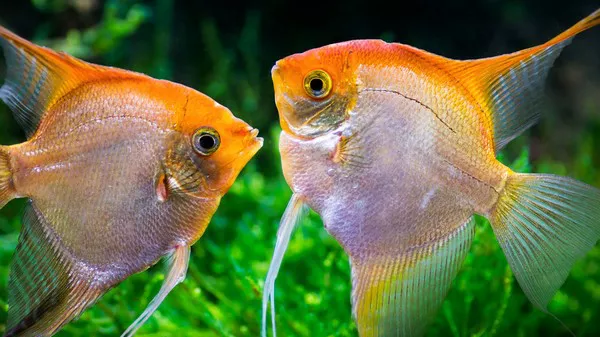The world of freshwater aquariums is a diverse and captivating one, with a plethora of species to choose from when creating your own underwater oasis. Two popular choices among aquarists are angelfish and goldfish, each with its unique charm and characteristics. However, a common question that arises in the aquarium community is, “Can goldfish live with angelfish?” In this article, we will explore the compatibility of these two species, the factors that influence their cohabitation, and essential guidelines for maintaining a harmonious tank environment.
Understanding Angelfish and Goldfish
Before addressing the question of whether angelfish and goldfish can coexist in the same tank, it’s crucial to understand the characteristics and requirements of each species individually.
Angelfish (Pterophyllum scalare) are known for their striking appearance, featuring tall, triangular bodies and elongated fins. These South American cichlids come in various color variations, making them a popular choice for aquarists. Angelfish are generally peaceful but can become territorial during breeding, defending their chosen spot as a nesting site. They thrive in water with a slightly acidic to neutral pH and prefer temperatures ranging from 78 to 84°F (25 to 29°C).
Goldfish (Carassius auratus) are among the most recognized and cherished freshwater fish worldwide. Their distinctive appearance, including the metallic scales and round bodies, makes them a favorite for beginners and experienced aquarists alike. Goldfish come in various breeds, such as common goldfish, comet goldfish, and fancy goldfish, each with its unique features. They are hardy fish that can tolerate a wide range of water conditions, but they prefer cooler water temperatures, typically around 65 to 75°F (18 to 24°C).
Can Goldfish Live with Angelfish?
The compatibility of angelfish and goldfish in the same tank largely depends on various factors, including the tank size, the individual temperaments of the fish, and their specific requirements. It’s essential to consider these factors when deciding whether to house these two species together.
1. Tank Size Matters: One of the critical factors influencing whether angelfish and goldfish can coexist is the size of the tank. Goldfish, especially common goldfish and comets, can grow quite large and produce a substantial amount of waste. Angelfish are more modest in size but require enough space to swim freely. Therefore, it is recommended to have a spacious aquarium of at least 75 gallons or more to provide adequate room for both species.
2. Water Temperature: As mentioned earlier, angelfish prefer warmer water temperatures, while goldfish thrive in cooler conditions. Maintaining a suitable temperature range for both species can be challenging. Goldfish may struggle in warmer water, leading to stress and health issues. Conversely, angelfish may not be as active or healthy in cooler water. Finding a compromise within the temperature range both can tolerate is essential.
3. Water Quality and Filtration: Goldfish produce a considerable amount of waste, and their presence can lead to poorer water quality if not properly managed. Angelfish are more sensitive to water conditions, and poor water quality can stress them or lead to disease. Adequate filtration and regular water changes are crucial to maintain optimal water quality for both species.
4. Feeding Habits: Angelfish are omnivorous and primarily feed on a diet of both live and prepared foods. Goldfish, on the other hand, are herbivores and consume mainly plant-based foods. Ensuring that both species receive the appropriate nutrition can be a challenge. It’s essential to find a balanced diet that meets the dietary needs of both angelfish and goldfish.
5. Compatibility of Temperaments: Angelfish are generally peaceful but can become territorial, especially during breeding. Goldfish, while not aggressive, can be opportunistic feeders and may nibble on the fins of slower-moving fish. Ensuring that the angelfish are not breeding or in a state of extreme aggression is vital for maintaining a peaceful tank environment.
6. Tank Decor and Hiding Spots: Providing hiding spots and visual barriers in the tank can help reduce potential conflicts between angelfish and goldfish. Angelfish appreciate tall plants and ornaments that they can claim as their territory. Goldfish will also benefit from ample hiding spots, as they may need refuge from more active fish.
7. Monitoring and Observation: Regular observation of your fish’s behavior is essential when housing angelfish and goldfish together. If you notice signs of aggression, stress, or health issues, it’s crucial to take action promptly. Separating the fish into different tanks may become necessary if their cohabitation poses risks to their well-being.
Conclusion
In conclusion, while it is possible to keep angelfish and goldfish together in the same tank, it requires careful consideration of various factors. The compatibility of these two species depends on the tank size, water parameters, feeding habits, and the temperament of the individual fish. If you are determined to keep angelfish and goldfish in the same aquarium, it is vital to provide ample space, maintain water quality, and closely monitor their interactions.
However, it’s important to note that keeping these two species together can be more challenging than housing them separately due to their differing requirements. If you are a beginner in the world of aquarium keeping, it may be advisable to gain more experience with each species individually before attempting to create a tank that accommodates both angelfish and goldfish.
Remember that the welfare of your fish should always be a top priority. If conflicts or health issues arise, be prepared to take appropriate action, which may include providing separate tanks for each species. Ultimately, the compatibility of angelfish and goldfish in the same tank can be achieved with the right conditions and careful management, but it is not without its challenges.
Related Topics:
What do angelfish look like when they re mating?
Are male or female angelfish more aggressive?
Can angelfish live with betta?
























